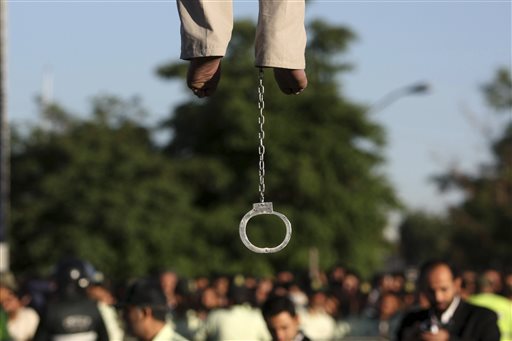Amnesty: Dozens of juvenile offenders face death in Iran

In this May 26, 2011 file photo, the feet of convicted man Mahdi Faraji, is seen with shackle, while he is being hanged, at the city of Qazvin about 80 miles (130 kilometers) west of the capital Tehran, Iran. Dozens of people who were arrested in Iran for crimes committed before they were 18 remain at risk of the death penalty despite recent reforms, with many having already spent years on death row, according to a report by Amnesty International released Tuesday, Jan. 26, 2016. (AP Photo/Mehr News Agency, Hamideh Shafieeha, File)
DUBAI, United Arab Emirates— Dozens of people who were arrested in Iran for crimes committed before they turned 18 remain at risk of the death penalty despite recent reforms, with many having already spent years on death row, according to a report by Amnesty International released Tuesday.
The London-based group also found that Iran has executed at least 73 juvenile offenders between 2005 and 2015, including at least four last year.
Amnesty’s 110-page report intensifies pressure on Iran at a time when Tehran is working to rebuild relations with the West following last year’s landmark nuclear deal. The agreement came into force this month after Iran took steps to curb its nuclear program, leading to the lifting of crippling international sanctions.
On Monday, Iranian President Hassan Rouhani arrived in Rome at the start of the first European trip by an Iranian president in almost two decades. The visit, which will also include stops at the Vatican and France, is expected to lead to a raft of business and trade deals.
Iran is one of the world’s largest users of the death penalty, ranking second behind China in 2014, according to the most recent figures from Amnesty. Most executions overall in Iran are carried out for drug smuggling. The country straddles a major narcotics trafficking route linking opium-producing fields in Afghanistan to Europe.
Article continues after this advertisementREAD: UN investigator: Executions in Iran could top 1,000 in 2015
Article continues after this advertisementAmnesty’s researchers were able to identify the names and locations of 49 juvenile offenders who face the death penalty, though the group notes that actual numbers could be higher. A 2014 U.N. report put the number of juvenile offenders at risk of execution at more than 160.
The majority of the 73 juvenile offenders Amnesty identified who were put to death over the past decade were convicted of murder. Others were executed for crimes including rape, drug-related crimes and national security offenses such as “enmity against God.”
The group noted that reforms introduced in 2013 give judges more discretion to take into account juvenile offenders’ mental maturity and potentially impose less harsh punishments, and that the Supreme Court has since said juvenile offenders facing execution could have their cases retried. Additional reforms introduced last year require that cases involving juveniles must be heard in special juvenile courts.
Still, Amnesty says more must be done.
“Despite some juvenile justice reforms, Iran continues to lag behind the rest of the world, maintaining laws that permit girls as young as nine and boys as young as 15 to be sentenced to death,” Amnesty said.
Iranian officials could not immediately be reached for comment.
READ: Report: Iran billionaire executed over $2.6B fraud
In late October, the United Nations’ special investigator on the human rights situation in Iran, Ahmed Shaheed, warned that executions in Iran have risen at an “exponential rate” since 2005 and could top 1,000 in 2015. He said Iran puts more people to death per capita than any other country, adding that the majority of executions do not conform to international laws banning the death penalty for juveniles and non-violent offenders.
The head of Iran’s Human Rights Council, Mohammad Javad Larijani, subsequently dismissed the U.N. report as “a collection of baseless accusations.”